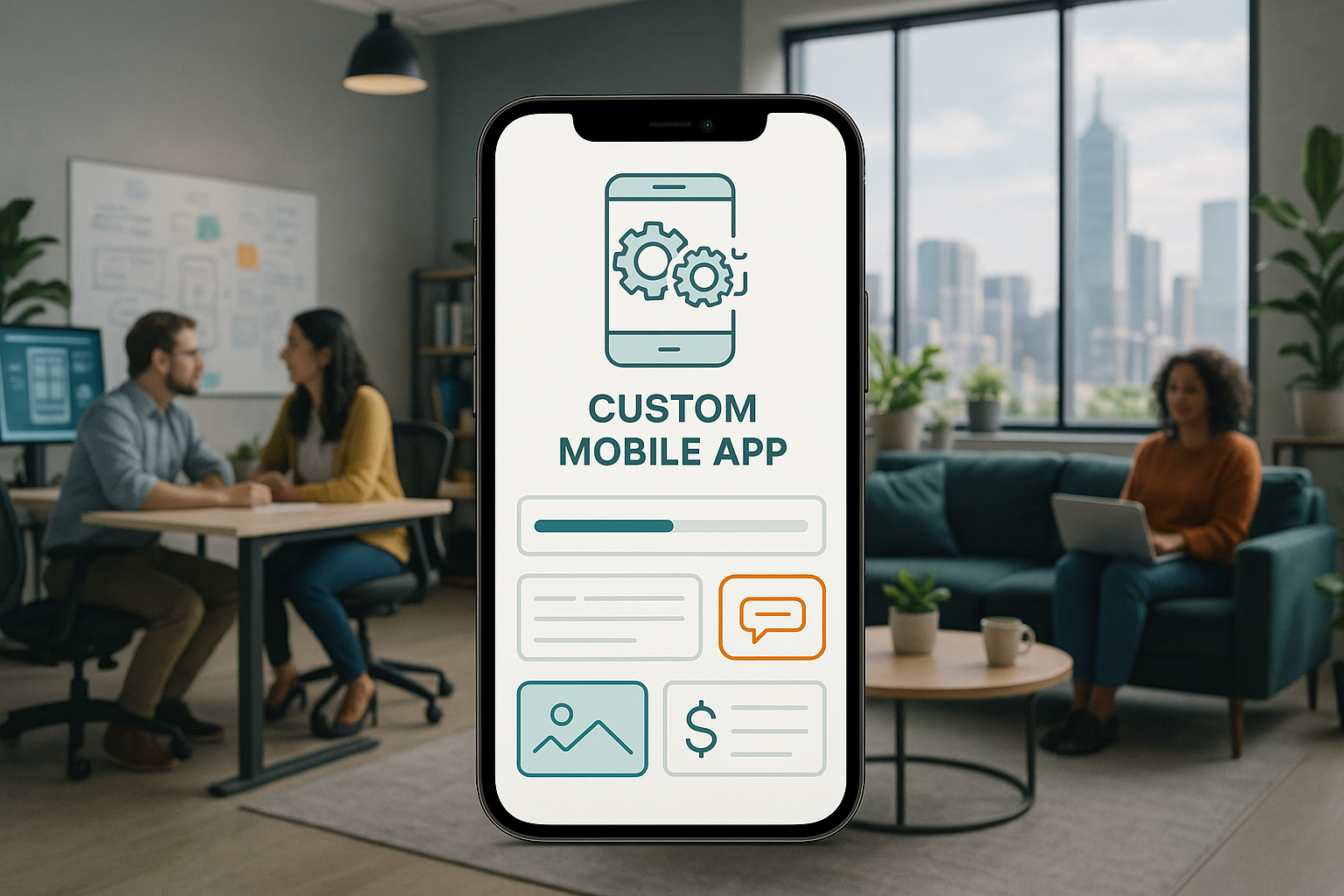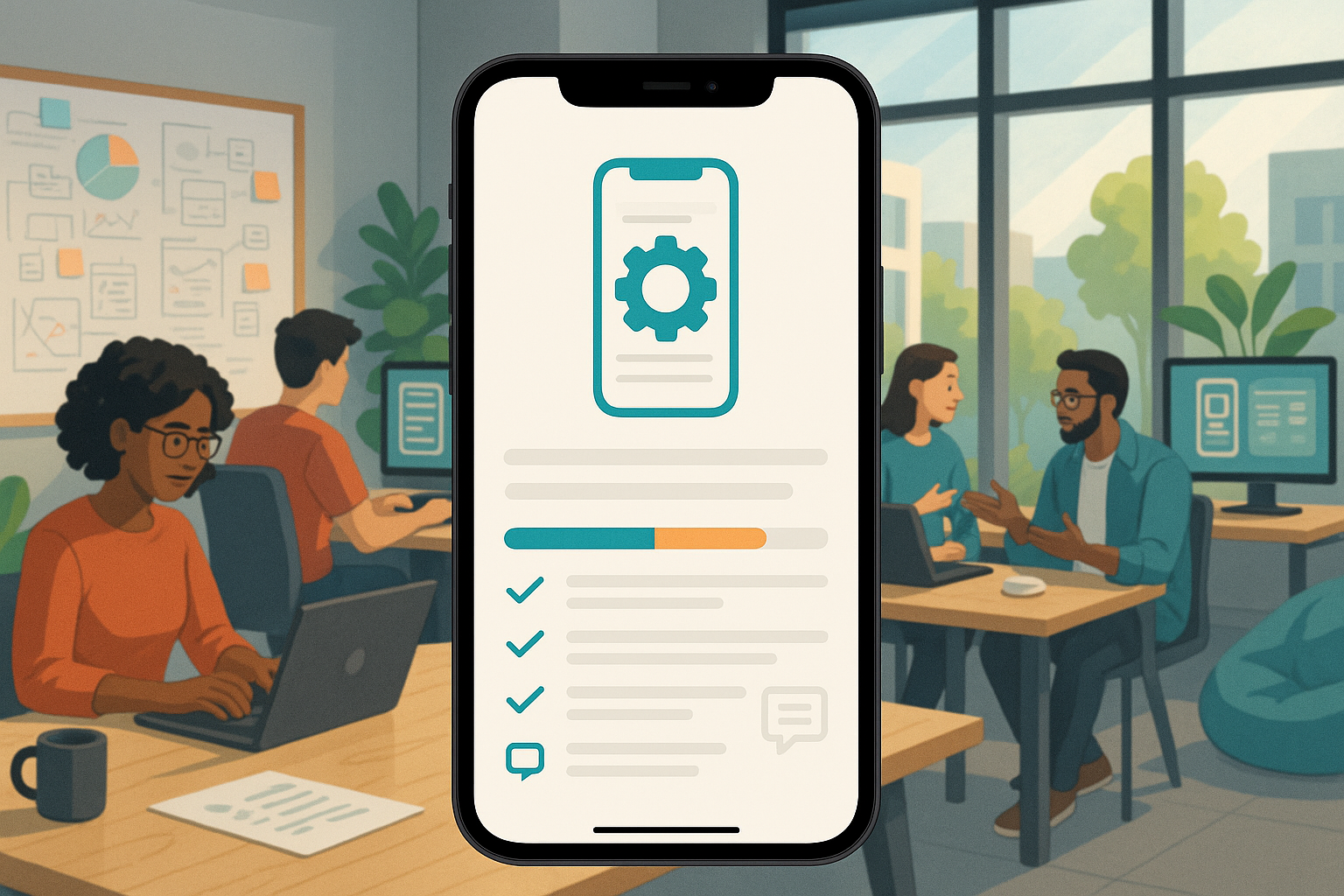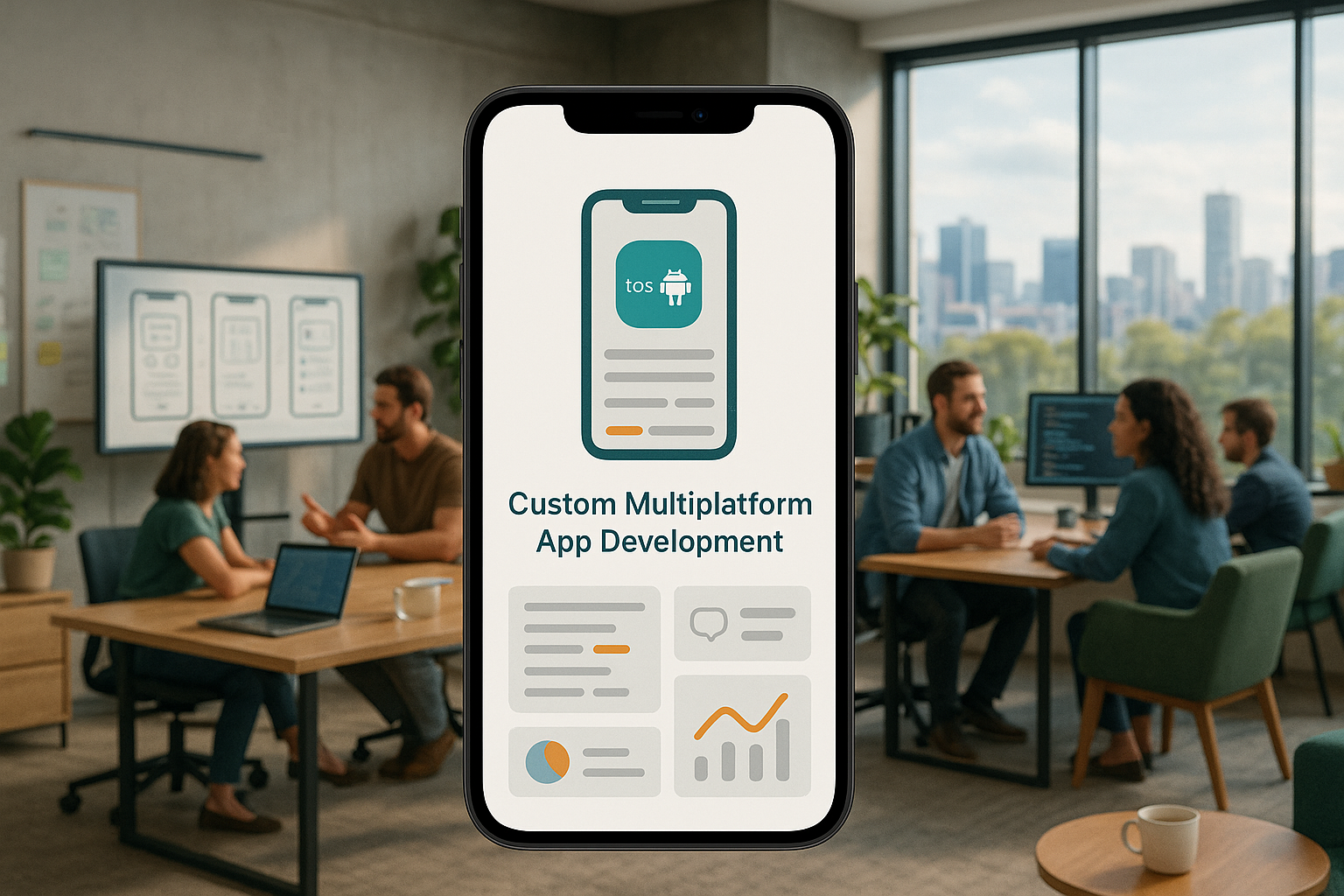Introduction
Transforming a brilliant idea into a functional, successful mobile application is a journey fraught with complexity. Many businesses underestimate the intricacies involved, from initial strategy and design to development, launch, and ongoing growth. The path is challenging, and the decision to build in-house can introduce unforeseen hurdles in team building, cost management, and overall execution. There is a higher risk of failure when development is handled internally, especially without a seasoned team.
This article serves as your comprehensive guide to custom mobile app development. We will explore what a custom mobile app is, detail the significant difficulties of building one in-house, outline the various types of applications you can create, and provide a realistic breakdown of development costs in 2024. Furthermore, we will introduce the top development companies in the United States that can turn your vision into a reality.
At MetaCTO, a top US AI-powered app development firm, we specialize in navigating these complexities for our clients. With over 20 years of experience, we don’t just build apps; we build businesses. We partner with you at every stage—from validating your concept with a rapid MVP to building, growing, and monetizing your final product. This guide will equip you with the knowledge you need, and demonstrate how our expert team can help you avoid common pitfalls and launch an app that is better than you could have imagined.
What is a Custom Mobile App?
A custom mobile app is a software application developed from the ground up to address the unique requirements of a specific business or a particular set of users. Unlike off-the-shelf software, which offers a one-size-fits-all solution, a custom app is meticulously tailored to your specific workflows, user base, and business objectives. This bespoke approach allows for unparalleled flexibility, scalability, and a competitive edge in the marketplace.
The core advantage of custom development lies in its ability to deliver a precisely targeted solution. Whether you need to integrate with proprietary backend systems, create a unique user experience (UX) that reflects your brand identity, or implement specialized features that no pre-built solution offers, custom development makes it possible. This results in an application that not only functions perfectly for your needs but also provides a seamless and engaging experience for your end-users, fostering loyalty and driving growth.
Reasons It Is Difficult to Develop a Custom Mobile App In-House
While the idea of maintaining full control over an in-house development project is appealing, the reality is often a minefield of challenges that can derail timelines, inflate budgets, and compromise the quality of the final product. Hiring an expert development agency like ours mitigates these risks, providing a clear path to success.
Team Assembly and Dynamics
A successful mobile app requires a diverse team of specialists, including project managers, UI/UX designers, iOS developers, Android developers, backend engineers, and QA testers.
- Assembling the Team: A company must first bring a development team together. Even if a business already employs some developers, it will most likely have to recruit new talent to fill critical skill gaps.
- Growing Pains: These new recruits have likely never worked with the existing team. This mix of new personalities, conflicting ideas, and different working styles can lead to a bumpy transition and natural growing pains as the team learns to collaborate effectively.
The High Cost of Hiring and Onboarding
Building an in-house team is not just about finding people; it’s a significant financial and time investment.
- Expensive and Lengthy Recruitment: Hiring experts for an in-house team is a long and expensive process. It requires significant time to find qualified individuals who not only possess the necessary technical skills but also fit well within the company culture.
- Onboarding Overheads: Once hired, new recruits must go through an onboarding process, which can be costly and time-consuming. This includes setting them up with HR and payroll, which adds another layer of expense.
Expertise Gaps and Project Risks
A lack of specialized mobile development experience within an in-house team can have severe consequences.
- Cost and Time Delays: A lack of deep expertise can lead to significant extra costs and project delays. If a team is not well-versed in the specific challenges of mobile development, costs can spike unexpectedly. For example, the company may need to invest in new software licenses or certificates required for proper app development.
- Full Responsibility, Partial Control: When developing an app in-house, the company assumes full control, which also means full responsibility for any failures. Yet, this control can be illusory. Overseeing a development team is a full-time job in itself, and in larger companies with multiple offices, direct communication and true oversight can be difficult. There is a greater chance an app will fail when developed in-house, representing a higher risk.
- Analysis Paralysis: With complete internal control, teams can fall into the trap of spending too much time tweaking, modifying, and second-guessing decisions. This endless cycle of revisions delays meaningful progress and can ultimately threaten the on-time launch of the application.
Partnering with an experienced agency like MetaCTO eliminates these issues. We provide a cohesive, expert team that is ready to start on day one, backed by proven processes and deep industry knowledge from launching over 120 successful projects. Explore our custom mobile app development services to learn how we can help you avoid these pitfalls.
Different Types of Custom Mobile Apps
The mobile app landscape is diverse, with applications categorized by their underlying technology and their function. Understanding these types can help you define the best approach for your project.
Technical App Types
Native Apps
Native apps are built for a specific operating system (OS), such as iOS or Android, using platform-specific programming languages like Swift or Objective-C for iOS and Kotlin or Java for Android. This allows them to take full advantage of the device’s features, resulting in high performance and a seamless user experience.
- WhatsApp: A native messaging application.
- Spotify: While it operates across many devices, its mobile versions are prominent native app examples.
- SoundCloud: A native app for sharing and listening to audio.
Hybrid Apps
Hybrid apps are built using web technologies like HTML, CSS, and JavaScript, then wrapped in a native container. This allows them to run on multiple platforms with a single codebase, potentially saving time and money.
- Gmail: A popular hybrid application for email.
- Evernote: A note-taking and organization app built as a hybrid solution.
- X (formerly Twitter): One of the most famous hybrid apps.
Functional App Types
Apps can also be categorized by their purpose.
- Information Apps: These apps deliver content to users. Examples include language learning applications and instructive game apps for children.
- Social Media Apps: These platforms connect people and facilitate sharing. Examples include Facebook, Instagram, Netflix, and Amazon Prime Video.
- Productivity Apps: Designed to help users manage tasks and improve efficiency. Examples include Serene (macOS), Todoist, Wunderlist, Trello, and Airtable.
- Lifestyle Apps: These apps center around various personal interests and activities. Popular examples are travel apps and meditation apps like Soulwise.
- Utility Apps: These provide practical tools or services. Examples include identification scanners, medical services applications, and trackers.
Cost Estimate for Developing a Custom Mobile App
Understanding the financial investment required is critical for planning a successful app launch. As of 2024, the cost of developing an iOS or Android app is virtually identical. The total budget is typically allocated across five key stages.
| Development Stage | Average Budget Allocation |
|---|---|
| Discovery | 10-15% |
| Design | 20-25% |
| Development | 40-55% |
| Testing | 15-20% |
| Deployment | 5-10% |
Based on the latest 2024 research from the B2B platform Clutch and other sources, here is a more detailed breakdown of what companies spend during each phase.
Discovery Stage Costs
This initial phase involves market research, competitor analysis, and defining the core features and project scope.
- Budgets of $5,000 to $10,000 typically constitute 10-20% of the total project cost.
- A higher bracket of $10,000 to $20,000 also represents 10-20% of the total budget.
- For more extensive discovery, costs of $20,000 to $40,000 account for 10-15% of the total.
- The most expensive bracket, $40,000+, makes up 5-10% of the total budget for highly complex projects.
Design Stage Costs
This stage focuses on creating the user interface (UI) and user experience (UX), including wireframes, mockups, and prototypes.
- The cheapest bracket of $5,000 to $10,000 represents 10-15% of the budget.
- Costs from $10,000 to $25,000 constitute 20-25% of the total budget.
- A bracket of $25,000 to $50,000 also accounts for 20-25% of the total.
- The most expensive design work, at $50,000+, constitutes 15-20% of the budget.
Development Stage Costs
This is the most resource-intensive phase, where the actual coding of the app takes place. It typically consumes between 40% and 50% of the entire budget.
- Common cost brackets for this stage include $30,000 to $70,000, $70,000 to $150,000, and $150,000 to $300,000.
- Very large projects with highly specialized features can require $300,000+, representing 35-45% of the total budget.
Testing and Deployment Stage Costs
This final phase ensures the app is bug-free and properly launched on the app stores.
- Overall spending for this combined stage ranges from $5,000 to $50,000.
- Simple apps with basic testing needs require $5,000 to $15,000 (10-15% of budget).
- Mid-complexity apps needing more extensive testing cost $15,000 to $30,000 (10-15% of budget).
- Complex apps requiring rigorous testing and a comprehensive deployment strategy cost $30,000 to $50,000 (10-15% of budget).
Top Custom Mobile App Development Companies
Selecting the right development partner is the single most important decision you will make. A great partner does more than write code—they provide strategic guidance, challenge assumptions, and become an extension of your team. Here are some of the top custom mobile app development companies in the U.S.
1. MetaCTO
As a premier AI-enabled mobile app development firm, we pride ourselves on being more than just developers; we are strategic partners dedicated to your success. With a 5-star rating on Clutch, 20 years of experience, and over 120 successful projects, our track record speaks for itself. We specialize in turning ambitious ideas into market-ready applications that attract customers and investors, having supported our clients in raising over $40 million in funding.
Our process is designed for speed and efficiency without sacrificing quality. With our Rapid MVP Development service, we can take you from concept to a market-ready Minimum Viable Product in just 90 days. This allows you to validate your idea, gather real user feedback, and secure funding on a tight timeline.
We handle every step of the journey:
- Validate: We turn your idea into an MVP quickly to test the market.
- Build: We manage the entire design, build, and launch process.
- Grow: We use A/B testing and analytics to optimize user acquisition and retention.
- Monetize: We help you implement effective monetization strategies, from subscriptions to in-app purchases.
- Evolve: We ensure your app scales with your business, incorporating the latest technology to keep you competitive.
Our work with clients like Mamazen, the #1 mindfulness app for parents, and G-Sight, a dry-fire training app using cutting-edge computer vision AI, demonstrates our ability to build apps that generate significant recurring revenue and create loyal fans.
2. Atomic Object
Located in Grand Rapids, MI, Atomic Object is a top-tier firm with a perfect “Ability to deliver” score of 40/40 on Clutch. They are known for their exceptional communication and ability to integrate seamlessly with client teams.
| Category | Details |
|---|---|
| Hourly Rate | $150 - $199 / hr |
| Min. Project Size | $25,000+ |
| Company Size | 50 - 249 employees |
| Service Focus | 50% Mobile App Development, 50% Custom Software |
| Average Project Cost | $200,000 – $999,999 |
With a 4.9 rating from 42 reviews, Atomic Object is praised for its partnership-centric approach. Clients feel they are working with “actual people” who care deeply about the project’s success. They have a strong record of developing both iOS and Android apps, often being retained for additional web-based products.
3. Goji Labs
Based in Los Angeles, CA, Goji Labs excels in designing and building mobile apps for iOS and Android, offering comprehensive project management and advisory services. They have a perfect 5.0 rating from 77 reviews.
| Category | Details |
|---|---|
| Hourly Rate | $100 - $149 / hr |
| Min. Project Size | $25,000+ |
| Company Size | 10 - 49 employees |
| Service Focus | 40% Mobile Dev, 40% UX/UI Design |
| Average Project Cost | $50,000 – $199,999 |
Clients consistently praise Goji Labs for professional project management, timely delivery, and an effective partnership approach. While some clients noted higher pricing, they also stated that the quality of work justifies the cost, with one saying, “you get what you pay for.”
4. TechAhead
Located in Agoura Hills, CA, TechAhead is a prominent mobile app development company with a strong 4.9 rating from 110 reviews. They are highly regarded for their responsiveness, professionalism, and user-centric design.
| Category | Details |
|---|---|
| Hourly Rate | $25 - $49 / hr |
| Min. Project Size | $25,000+ |
| Company Size | 50 - 249 employees |
| Service Focus | 50% Mobile App Development, 15% AI |
| Average Project Cost | $50,000 – $199,999 |
TechAhead has received overwhelmingly positive feedback, with ten 5-star reviews in the past six months alone. Clients highlight their impressive design, project management skills, and clear communication. They recently designed and developed iOS and Android apps for a waste management company using React Native.
5. Mercury Development
With a U.S. office in Aventura, FL, Mercury Development is a versatile firm praised for its expertise, professionalism, and high-quality code. They hold a perfect 5.0 rating based on 26 reviews.
| Category | Details |
|---|---|
| Hourly Rate | $50 - $99 / hr |
| Min. Project Size | $25,000+ |
| Company Size | 50 - 249 employees |
| Service Focus | 50% Mobile Dev, 30% Custom Software |
| Average Project Cost | $200,000 – $999,999 |
Clients view Mercury Development as a strong partner capable of handling complex projects and seamlessly integrating with in-house teams. One client emphasized the effectiveness of their daily scrums and bi-weekly meetings. They are perceived as offering good value, with competitive pricing and high-quality deliverables.
6. Cheesecake Labs
Based in San Francisco, CA, Cheesecake Labs is a proficient mobile development company known for its strong project management, proactive communication, and technical competence. They have a 4.9 rating from 60 reviews.
| Category | Details |
|---|---|
| Hourly Rate | $50 - $99 / hr |
| Min. Project Size | $50,000+ |
| Company Size | 50 - 249 employees |
| Service Focus | 50% Mobile Dev, 40% Custom Software |
| Average Project Cost | $50,000 – $199,999 |
Approximately 90% of their reviews commend their ability to deliver on time and within budget. Clients express high satisfaction with their honest communication and commitment, with one CEO noting their “clear and honest communication.” They also offer distinct packages, including a $100,000 MVP package for startups.
7. JPLoft
Located in Denver, CO, JPLoft is a comprehensive mobile development company with a perfect 5.0 rating from 82 reviews. They are praised for their advanced programming skills and effective project management.
| Category | Details |
|---|---|
| Hourly Rate | $50 - $99 / hr |
| Min. Project Size | $10,000+ |
| Company Size | 50 - 249 employees |
| Service Focus | 60% Mobile App Development |
| Average Project Cost | $10,000 – $49,000 |
Clients highlight JPLoft’s ability to deliver high-quality work on time and even suggest improvements that enhance the project. Their extensive experience, with over 1,100 completed projects, gives clients confidence in their ability to handle complex situations.
8. Dedicated Developers
Based in Atlanta, GA, Dedicated Developers is known for its reliability and efficiency, holding a perfect 5.0 rating from 46 reviews. All clients highlight the team’s project management and dedication.
| Category | Details |
|---|---|
| Hourly Rate | $50 - $99 / hr |
| Min. Project Size | $25,000+ |
| Company Size | 10 - 49 employees |
| Service Focus | 65% Mobile App Development, 35% Web Dev |
| Average Project Cost | $200,000 – $999,999 |
With ten 5-star reviews in the past six months, clients consistently praise their responsiveness and technical expertise. One CEO noted, “You can assign tasks one day, and they are done by the next morning.” They are also commended for their exceptional value for money.
9. Empat
Located in San Francisco, CA, Empat is a versatile company with a perfect 5.0 rating from a staggering 129 reviews. They consistently deliver cost-effective, high-quality solutions.
| Category | Details |
|---|---|
| Hourly Rate | $25 - $49 / hr |
| Min. Project Size | $25,000+ |
| Company Size | 50 - 249 employees |
| Service Focus | 50% Mobile Dev, 40% Web Dev |
| Average Project Cost | Varies (packages from $15k to $50k+) |
100% of clients praise their communication, project management, and cultural alignment. Recent feedback highlights their exceptional technical expertise and proactive problem-solving, with one client calling them a “valuable long-term partner.” They offer clear packages, including a $25,000 MVP.
10. Designli
Based in Greenville, SC, Designli holds a perfect 5.0 rating from 68 reviews. They are praised for their responsiveness, project management, and ability to meet deadlines and budgets.
| Category | Details |
|---|---|
| Hourly Rate | $50 - $99 / hr |
| Min. Project Size | $10,000+ |
| Company Size | 50 - 249 employees |
| Service Focus | 30% Mobile Dev, 30% Custom Software |
| Average Project Cost | $10,000 – $49,000 |
All 34 of their mobile app development reviews are 5-star. Clients consistently highlight their exceptional communication, flexibility, and clean, intuitive design work. They offer a unique “SolutionLab” exploratory sprint for $13,800 to roadmap a product and deliver a clickable prototype.
Conclusion
Developing a custom mobile app is a significant undertaking, but with the right knowledge and the right partner, it can be a transformative investment for your business. We have covered the fundamental challenges of in-house development, from team building to managing costs and risks. We’ve explored the different types of mobile applications, provided a realistic cost breakdown for 2024, and highlighted some of the best development firms in the nation.
The key takeaway is that success often hinges on collaboration with an expert team that can guide you through every stage of the process. An experienced agency mitigates the risks of in-house development and provides the strategic insight needed to build a product that resonates with users and achieves your business goals.
If you are ready to turn your app idea into a reality the right way, from day one, we are here to help. Start strong, build smart, and scale fast with a partner you can trust.
Talk with a MetaCTO expert today to kick off your project with a clear plan for success.






